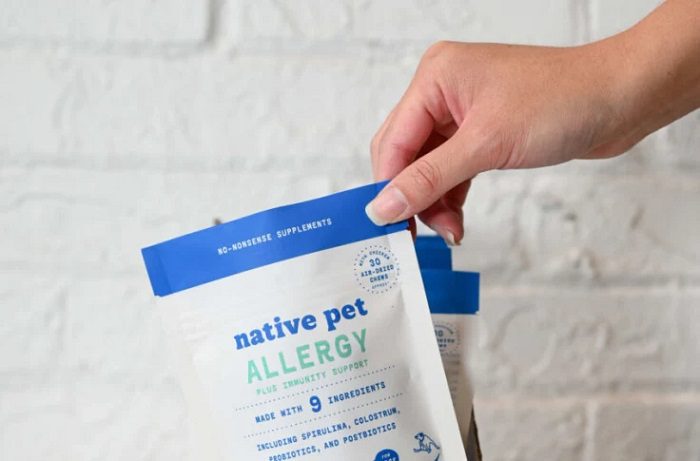If you are a pet owner, you know that dog allergies are common. In fact, according to the American College of Allergy, Asthma, and Immunology, allergies account for up to 60 percent of all visits to veterinarians. However, some effective natural remedies can help alleviate your dog’s allergy symptoms.
This blog post will discuss three remedies and provide tips for administering them. So read on if, as dog owners, you want to find out more about how to help your furry friend feel better.
What Are Different Dog Allergies?
Contact Allergies
Contact allergies are caused when the skin directly interacts with an allergen, such as pollen, dust mites, or specific cleaning products. Symptoms can include redness, itching, and hair loss in the area exposed to the allergen.
Treatment usually involves avoiding contact with whatever is causing the allergic reaction and using topical treatments such as medicated shampoos or ointments.
Food Allergies
Food allergies are one of the most common types of allergies in dogs. These occur when your pup has an adverse reaction to something they ate or drank. Common food allergens include dairy products, grains, eggs, beef and pork products, fish, or other ingredients in their diet. Symptoms may include vomiting and diarrhea after eating certain foods; rashes on their skin; sneezing; coughing; or even difficulty breathing.
The best way to identify a food allergy is through an elimination diet trial—in which you gradually remove items from their diet until you find out what is causing the reaction—and by consulting your veterinarian for guidance on how to proceed with diagnosis and treatment.
Inhalant Allergies
Inhalant allergies are caused by airborne substances such as dust mites, mold spores, pollen from trees or grasses, or cigarette smoke that your pet inhales into their lungs. Symptoms can range from sneezing and coughing to itchy skin rashes and irritated eyes.
Treating inhalant allergies usually involves removing your dog from exposure to whatever is causing the allergic reaction (if possible) and using antihistamines to reduce symptoms. At the same time, other therapies are pursued (such as immunotherapy). Corticosteroids may also be prescribed if necessary.
Environmental Allergies
Dogs can develop allergic dermatitis when exposed to specific environmental allergens like humans. These allergens may include pollen, dust mites, mold spores, or other airborne particles.
If your pup is experiencing symptoms such as sneezing or itching after exposure to these allergens, it may suffer from an environmental allergy. The best way to treat this type of allergy is by avoiding the allergen and antihistamines that can help reduce their symptoms.
Flea Allergies Dermatitis (FAD)
Flea allergies dermatitis is a condition caused by an allergic response to flea bites. This condition is more common in dogs than cats and results in itchy areas and hair loss due to intense scratching and biting at the site of a flea bite.
To prevent FAD, you should make sure your pup is on a monthly flea control medication and regularly groom them with a flea comb or vacuum cleaner attachment that sucks up any potential fleas on their fur.
What Are the Signs That My Dog is Experiencing Allergies?
Itchy Skin and Excessive Licking or Chewing
One of the dogs’ most common signs of allergies is itchy skin or excessive licking, biting, or chewing on their fur and skin. This is often caused by flea bites, food sensitivities, environmental allergens such as pollen or grasses, or contact allergies from soaps and detergents used around the home.
Runny Nose and Watery Eyes
If your pup has a runny nose or watery eyes (or both), this could be a sign that they are having an allergic reaction to something in their environment. Pollen, dust mites, and mold spores can cause respiratory irritation in dogs like humans do when we have hay fever symptoms.
Gastrointestinal Issues
Gastrointestinal issues like vomiting or diarrhea can also occur due to allergies in dogs; usually, this is caused by food sensitivities, but it can also occur due to environmental allergens.
If you notice any changes in your pup’s eating habits—including loss of appetite—or if they seem uncomfortable after eating certain foods, this could be another sign that they are having an allergic reaction to something they have ingested.
Natural Remedy for Dog Allergy
Oatmeal Baths
A soothing oatmeal bath is one of the best natural remedies for relieving your pup’s skin irritation associated with allergies. Soak your dog in an oatmeal bath to reduce inflammation and soothe itching and dryness. Depending on your pup’s allergy symptoms, you should do this once or twice a week.
To make an oatmeal bath:
- Grind 1 cup of rolled oats into a fine powder and add it to lukewarm water in the bathtub.
- Once you have added the oats, stir until they dissolve completely before adding your pup to the mixture.
- Allow them to soak for 15-20 minutes before rinsing them off and drying them thoroughly with a towel.

Aloe Vera
Aloe Vera has potent anti-inflammatory and healing properties that can help reduce redness and swelling caused by allergic reactions in dogs. You can apply aloe vera directly onto your pup’s skin or give them an aloe vera gel orally if their response is particularly severe.
However, it is essential to note that aloe vera should never be given orally without consulting a veterinarian first. It may contain toxic ingredients such as xantham gum which could cause gastrointestinal distress if ingested in large doses.

Supplements
Supplements are another great way to help manage allergies in dogs naturally. For example, omega-3 supplements contain essential fatty acids, which can improve overall skin health while reducing inflammation caused by allergies.
They can also be used as part of an allergy prevention routine when given regularly over time. They help strengthen the immune systems against allergens while moisturizing the skin from within.
You should consult your veterinarian before starting any supplement routine, though, as some supplements may interfere with other medications or treatments your pup may be taking for their condition.

Coconut Oil
Coconut oil is one of the most versatile natural remedies and can be used in various ways to help reduce dog allergies. For example, coconut oil can be applied directly onto your pup’s skin or orally as a supplement to reduce inflammation and itching.
It also helps boost the dog’s immune system, which is important when dealing with allergens. For oral supplementation, start with one teaspoon per 10 pounds of body weight for two weeks and then increase by 1/4 teaspoon every week until you reach the desired dosage (1 tablespoon per 10 pounds).

Apple Cider Vinegar
Apple cider vinegar has many uses when treating various ailments in pets—including allergies. For example, it acts as an anti-inflammatory agent and helps bacterial balance levels in the gut, which can help keep allergy symptoms at bay.
To use apple cider vinegar as a remedy for your pup’s allergies, mix two tablespoons into 8 ounces of water and give it to them once or twice daily. You should see results within a few days or weeks, depending on the severity of their symptoms. Monitor your pet closely during this time to ensure they don’t have any adverse reactions.

Epsom Salt Baths
Native Pet’s Allergy Chews are a great all-natural moisturizer for helping relieve allergic reactions in dogs caused by environmental factors such as pollen and dust mites.
These chewable contain natural ingredients like quercetin, vitamin C, nettle extract, licorice root extract, olive leaf extract, ginger root extract, peppermint oil extract, green tea extract, and more that work together to provide relief from allergy symptoms such as sneezing or coughing due to seasonal changes or other environmental irritants.
They come in easy-to-administer chews that can be given once or twice daily depending on your pup’s needs—making them perfect for busy pet parents who need an easy solution.

Native Pet’s Allergy Chews
Native Pet’s Allergy Chews are a great all-natural solution for helping relieve allergic reactions in dogs caused by environmental factors such as pollen and dust mites.
These chewable contain natural ingredients like quercetin, vitamin C, nettle extract, licorice root extract, olive leaf extract, ginger root extract, peppermint oil extract, green tea extract, and more that work together to provide relief from allergy symptoms such as sneezing or coughing due to seasonal changes or other environmental irritants.
They come in easy-to-administer chews that can be given once or twice daily depending on your pup’s needs—making them perfect for busy pet parents who need an easy solution.

Final Thoughts
These natural remedies for dog allergies can be a great starting point for parents looking for relief from their pup’s allergy symptoms. However, remember that every puppy is different and what works for one may not work for another, so it’s best to consult your veterinarian before starting any supplement routine or adding new ingredients to their diet.
Frequently Asked Question
HOW CAN I TREAT MY DOG’S SKIN ALLERGY AT HOME?
Dogs with itchy, hot skin spots risk getting rubbed raw. To prevent this from happening, you should add chamomile flowers or calendula petals into your dog’s bath water because they soothe and cool irritated skin while also reducing inflammation which helps heal wounds quickly.
WHAT ARE NATURAL ANTIHISTAMINES FOR DOGS?
The antihistamine Benadryl or Apoquel is often used to treat allergies in dogs. While they relieve symptoms, these medications can come with negative side effects like drowsiness and weight gain, which could be bothersome for your pup.
WHAT CAN I GIVE MY DOG TO STOP ALLERGIES?
The over-the-counter allergy medication Benadryl is an excellent choice for dogs with mild to moderate allergies. It works well in most cases of seasonal, food, and environmental allergens and allergic reactions from a snake or insect bites.
WHAT HOME REMEDY STOPS DOGS FROM ITCHING?
Home remedies for your dog’s itchy skin include Colloidal oatmeal baths, fish oil, or baking soda. You should try these home remedies if you are tired of buying prescriptions that don’t work.






